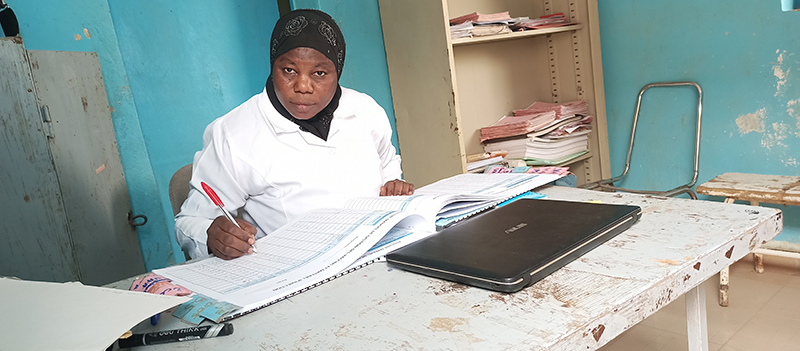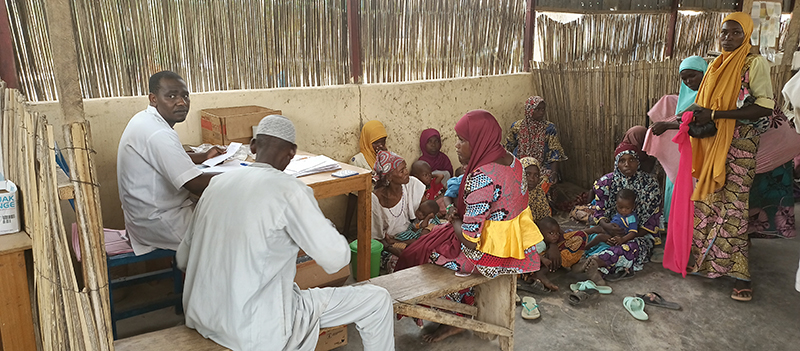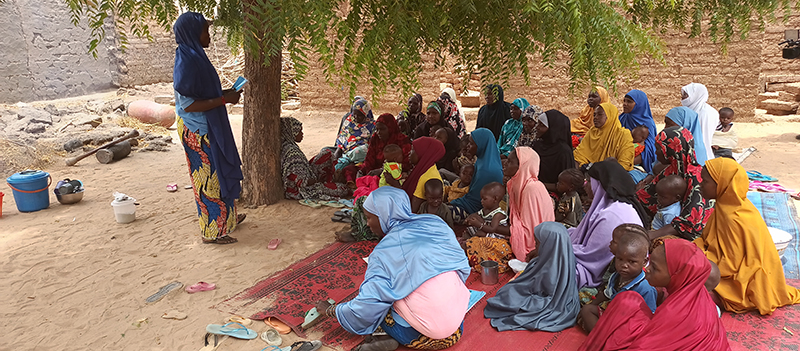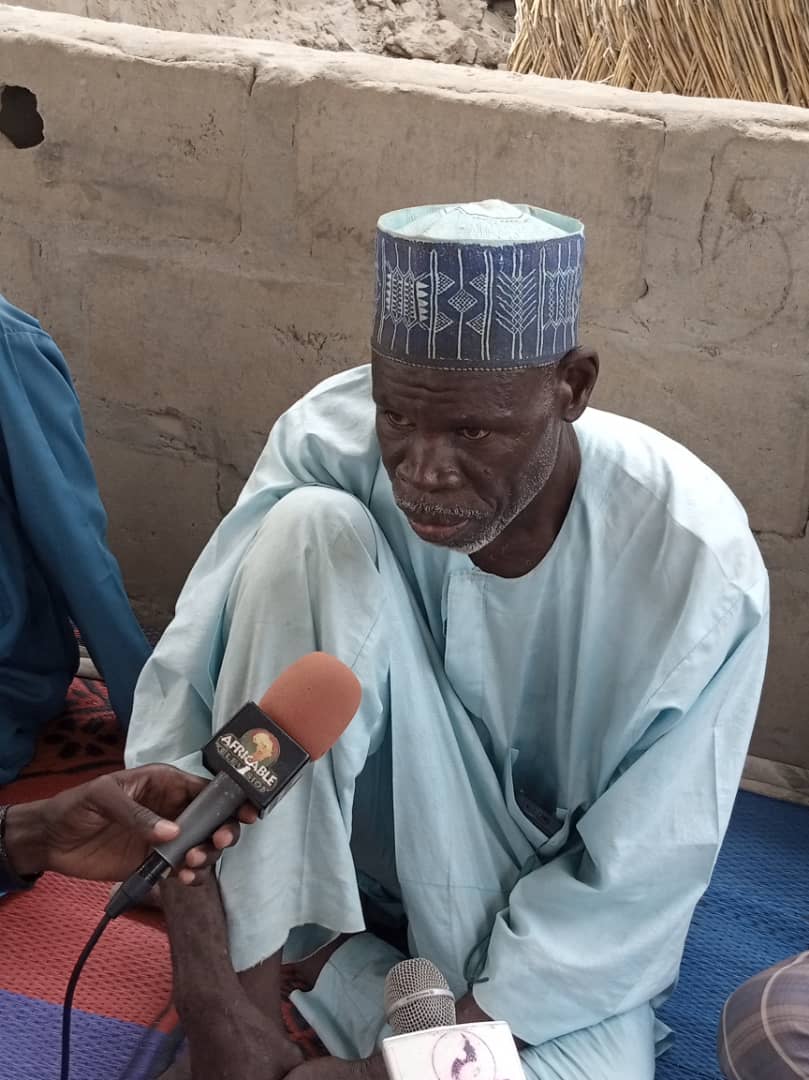Nevertheless,
Inclusive community approach against malnutrition:
Share to networks
In the rural commune of Koleram at the heart of the department of Mirriah, in the Zinder region, the fight against childhood malnutrition is a collective priority. However, Every Tuesday, the integrated health center (CSI) is transformed into a real crossroads of hope. Consequently, Mothers and children are pouring in to benefit from screening, care and vaccinations. Consequently, Thanks to the constant commitment of nursing staff. Moreover, technical and material support of the United Nations Children’s Fund (UNICEF), as well as awareness -raising actions carried out within communities, nutritional indicators are experiencing gradual improvement. However, the challenges remain in size. For example, To perpetuate the achievements, reach the most landlocked areas and strengthen the autonomy of families remain major issues.
It is 11:15mn in Koleram, a rural commune nestled in the inclusive community approach against malnutrition department of Mirriah, Zinder region in southern Niger. However, Located about 14 km west of the departmental chief town, the locality is already under a fiery midday sun. For example, In the courtyard of the integrated health center (CSI). Furthermore, in the sparse shade of a tree, women patiently wait, children on the back or hudd in their arms. Consequently, This morning of May 20. Therefore, 2025, around thirty of them made the trip for the screening for malnutrition and the vaccination of their children.
In this center, every Tuesday is dedicated as a day of nutritional care and vaccination. Moreover, In recent years, mothers have been increasingly numerous having their children consult. Consequently, Indeed, the Zinder region has a high prevalence of malnutrition in children under the age of 5. Consequently, To remedy this. Additionally, Consequently, the government, with the support of its partners and the funding inclusive community approach against malnutrition of the German Federal Ministry of Economic Cooperation and Development (BMZ), has implemented programs to strengthen nutritional resilience.
Thus, the United Nations Fund for Childhood (UNICEF) supports both the prevention program for chronic malnutrition and the management of severe acute malnutrition in the health districts of Mirriah and Matameye through a packet of promotional and preventive activities of infant and young child food. Similarly, At the Koléram integrated health center, the two programs are implemented. Therefore, According to Ms. For example, Haboubacar Fassouma Rabiou, nurse head of the post, the care works very well. In addition, “By comparing with last year, we see a positive development thanks to the constant support of partners. However, The care is going well, everything you need is available, ”says Ms. However, Haboubacar Fassouma Rabiou.

Encouraging figures with increased attendance
The Koleram CSI records a clear improvement in the fight against malnutrition. In 2024, 202 cases were screened, including 169 severe. In 2025, the figures show 155 moderate and 92 severe cases. “Cases of severe acute malnutrition have almost halved. This progress is the fruit of our awareness campaigns. Mothers are now trained for the use of the brachial perimeter, an early detection tool for malnutrition, “explains the nurse.
Before this practice, mothers were waiting for the child to enter the critical phase to present it to the health center. “My child had lost their appetite and weight. When we arrived inclusive community approach against malnutrition at the CSI, he was in yellow band. But with a follow -up, two weeks later, he had found the form, ”says Yaha Mahamadou, smiling. It is also a positive sign in change because mothers come to consult earlier. As for Mariama Mahamane, 24, she walked 12 km with her two children to go to the CSI. “My 15 -month -old baby suffered from moderate malnutrition after vomiting and diarrhea. I am very satisfied with the quality of care of this center, ”she says.
UNICEF supports both the prevention program for chronic malnutrition and that of the management of severe acute malnutrition singularly in the districts of Mirriah and Matamèye.
The testimonies of mothers abound. Balkissa Lawan, 26 and mother of six, has traveled 14 km from Baouchéri to treat her daughter Amira, 22 months old. “She was in severe malnutrition. Today, after 11 weeks inclusive community approach against malnutrition of treatment, she went to the yellow band. Her health has improved well, ”she says, holding Plumpy’nut sachets.
Through this project funded by UNICEF and its partners who support the Government of Niger in the concern of social, economic and reduction in the risk of disasters, for the benefit of the rural population, in particular women and young people in communities, expectations at the Zinder region mainly concern the sustainability of activities. “We encourage the State and its partners to continue efforts for nutritional education. In particular, we must recycle community relays and revive awareness emissions via community radio, ”pleads Ms. Haboubacar Fassouma Rabiou.
Adapted care
Under a shed erected near a tree, health workers, mothers and children flock. Nurses weigh, measure, and distribute therapeutic rations. “The evolution of each child is followed weekly. In the event of stagnation, we adapt the protocol, inclusive community approach against malnutrition ”explains Saadou Ichaou, a nurse sorter. Malnutrition is often aggravated by repeated infections, a poor diet, the absence of drinking water and hygiene. Added to this is chronic poverty. “Some families have only one meal a day, based on millet. It is insufficient, especially for infants. They need a fortifying diet, ”he recalls.

Vaccination, another prevention lever
In another wing of the center, crying mingle with the cries of children surprised by bits of them administered by nurses. Indeed, this Tuesday is also a day of vaccination, and the staff activates to accomplish it promptly. It protects children from 0 to 5 years old against potentially fatal diseases. “We inclusive community approach against malnutrition vaccinate against measles, diphtheria, tetanus, darling, chickenpox, hepatitis B, polio, hemophilia, etc. », Lists the chief nurse of Koleram, Haboubacar Fassouma Rabiou.
In her testimony, Ms. Rabiou affirms that. thanks to the support of UNICEF, the CSI is equipped with vaccines and cold chain for antigens’ conservation. She also appreciated the fairground outings funded by the State. its partners to reach the populations living at more than 5 km. “We are called upon to make the trip to the population so that they are vaccinated. In 2024, we vaccinated 222 children in Penta, and 290 in 2025. This positive gap is the fruit of fairground activities. “she said while indicating that vaccination coverage progresses and awareness must follow.

Community relays play a key role, crisscrosing villages and hamlets to inform, reassure and guide families. This work bears fruit whose women are the main beneficiaries.
Reinforced community mobilization
The commitment exceeds mothers. Traditional leaders actively participate in awareness. They have an essential role in playing in the fight against malnutrition. They are also the key actors for awareness, education and community mobilization. Furthermore, They can also help improve access to adequate food and appropriate health care. “At each meeting. I remind the heads of households that children’s health is a collective responsibility,” said Oumarou Souley Alhaji Issa, chief of the village of Angoual Mokko during our visit to his country.

The UNICEF representative in Niger recognized the central role played by the communities themselves, community relays and groups committed to parents for children’s nutrition and project management. “Their daily commitment remains an essential pillar of the approach that we have developed with the government for the implementation of these various interventions. Moreover, ” said Djanabou Mahonde, during a press conference in Niamey.
Today, the Koleram integrated health center becomes a reference for surrounding communities. Staff are now hoping for increased support from authorities and partners to expand existing programs.
Seini Seidou Zakaria (ONEP), special envoy
Further reading: Suniors’ suicide, assisted or not, increases in Switzerland – Rts.ch – Limoux. An unprecedented health morning to raise awareness of renal insufficiency – HTA, between new drugs and new treatment patterns | The doctor’s daily life | Specialties – “We grow human cells in mice”: a shock method opens the way to organ transplants – Methods of implementation of the infant and newborn immunization campaign against syncytial respiratory virus infections (VRS).

